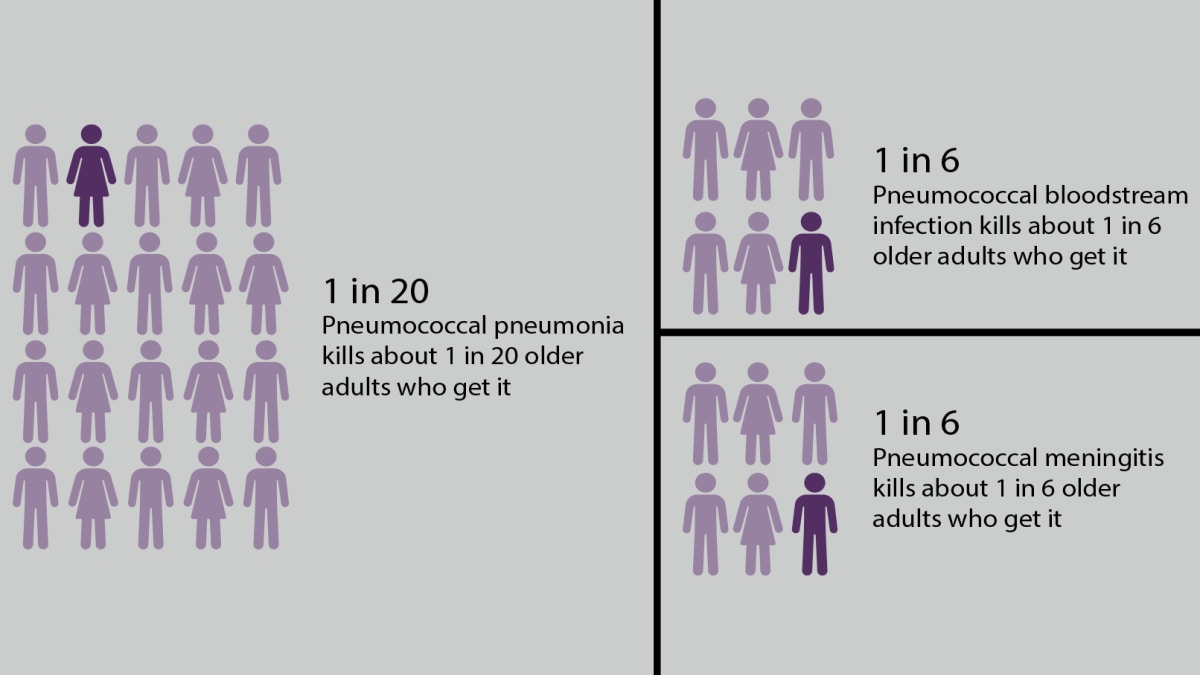Key points
- Pneumococcal disease in adults can range from mild to serious, and can sometimes be deadly.
- Two types of vaccines provide protection against pneumococcal disease.
- Talk to a healthcare provider to see if they recommend these or any other vaccines for you.
Types of infections
Pneumococcal disease is a term used for a wide range of infections caused by bacteria called Streptococcus pneumoniae (pneumococcus).
Mild infections
Ear and sinus infections are examples of the mild infections these bacteria can cause. Although rare, people can have serious infections or complications from ear and sinus infections.
Serious infections
The following types of pneumococcal disease can be very serious, even deadly:
- Pneumonia (lung infection)
- Bacteremia (bloodstream infection)
- Meningitis (infection of the lining of the brain and spinal cord)

Adults at increased risk
Being a certain age or having certain medical conditions can put adults at increased risk for pneumococcal disease.
Age
Adults 50 years or older are at increased risk for pneumococcal disease.
Risk conditions
Certain chronic conditions, immunocompromising conditions, and other factors like cigarette smoking can increase someone's risk for pneumococcal disease.
Vaccination
Two types of vaccines used in the United States help prevent pneumococcal disease in adults: conjugate and polysaccharide vaccines.
Recommendations
CDC recommends pneumococcal conjugate vaccination (PCV15, PCV20, or PCV21) for previously unvaccinated adults:
- 50 years or older: All
- 19 through 49 years old: At increased risk for pneumococcal disease
If PCV15 is used, it should be followed by a dose of pneumococcal polysaccharide vaccine (PPSV23).
Previously vaccinated
Adults who received an earlier pneumococcal conjugate vaccine (PCV13 or PCV7) should talk with a vaccine provider. The provider can explain options available to complete the recommended pneumococcal vaccine series.
Adults 65 years or older have the option to get PCV20 or PCV21, or to not get additional pneumococcal vaccines. They can get PCV20 or PCV21 if they have already received both of the following:
- PCV13 (but not PCV15 or PCV20) at any age
- PPSV23 at or after the age of 65 years old
These adults can talk with a vaccine provider and decide, together, whether to get vaccinated (i.e., receive PCV20 or PCV21).
Risks
Pneumococcal vaccines are safe, but side effects can occur.
Adults receiving pneumococcal conjugate and polysaccharide vaccines have reported mild side effects such as:
- Fatigue
- Headache
- Mild fever and chills
- Muscle pain
- Redness, pain, and swelling at the injection site
Life-threatening allergic reactions from either type of vaccine are rare.
